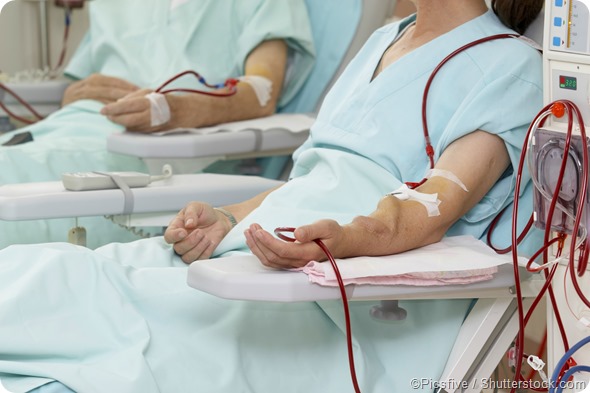Renal replacement therapy (RRT) is a term used to refer to modalities of treatment that are used to replace the waste filtering functions of a normal kidney. Acute kidney insufficiency (AKI) causes progressive deterioration in the regulation of body acid-base balance, as well as electrolyte and fluid balance. In such a setting, RRT is essential to assist the body to survive ensuing metabolic derangements.
Researchers have noted that dialysis, which is one of the most common RRT used, cannot compensate for all the tasks performed by a kidney, and thus the term ‘renal support therapy’ has been suggested to be a better name.

Patients receiving hemodialysis in a hospital
Indications for RRT
RRT is used whenever the kidney functions fail to achieve homeostasis. This includes situations such as:
- Acute kidney insufficiency
- Chronic renal failure
- Myasthenia gravis
- Septic shock
- Acute hepatic failure superimposed on chronic failure
Modes of RRT
Different techniques used for RRT include:
- Intermittent Hemodialysis (IHD) – often associated with hypotension, allows only intermittent removal of wastes
- Continuous RRT – more costlier and complex, requires continuous anticoagulation therapy, avoids hypotensive episodes
- Slow continuous ultrafiltration (SCUF)
- Continuous venovenous hemodialysis (CVVHD)
- Continuous venovenous hemofiltration (CVVHF)
- Continuous venovenous hemodiafiltration (CVVHDF)
- Continuous arterio-venous hemofiltration (CAVHF)
- Slow low-efficiency daily dialysis (SLEDD)
- Peritoneal dialysis
- Plasmapheresis or plasma exchange
What is Dialysis? Types of Kidney Dialysis Explained by Dr. Rammohan | Narayana Health Group
Criteria for RRT
Initiation of RRT is based on criteria such as:
- Oliguria (insufficient urine output)
- Anuria (the absence of urine production)
- High serum creatinine and urea levels above fixed criteria
- Metabolic acidosis without compensation
- Dangerous fluctuations in serum sodium and potassium
- Pulmonary edema which does not respond to diuretic therapy
- Temperature soaring above 40 0C
- High blood urea with complications such as encephalopathy, neuropathy or pericarditis
- Cardiac failure
- Lithium overdose
- Patients who need to be infused with large amounts of fluid or blood, but cannot tolerate volume infusions without risk of pulmonary edema
- Hypothermia
Chronic renal failure with refractory volume expansion, acidosis or hyperkalemia, a bleeding diathesis or uremic symptoms
The principle of RRT
RRT is based on semi-permeable membrane use to filter out wastes in the form of solutes, by diffusion or convection, and excessive water, in a process called ultrafiltration. The rate of ultrafiltration depends upon transmembrane pressure and the membrane permeability.
Moreover, the diffusion of the solute depends upon factors such as:
- The inter-compartment concentration gradient separated by the membrane
- Temperature
- Diffusion coefficient
- Surface area of the membrane
- Solute characteristics such as molecular weight, protein-binding and the flow rate of blood as well as dialysate flow
Basic mechanism of different modes of RRT
Hemofiltration depends on water removal by a transmembrane pressure which is above the oncotic pressure of the plasma. In peritoneal dialysis water is removed by increasing the osmolarity of the dialysate.
Intermittent hemodialysis depends on the same mechanism as hemofiltration to remove excess water. It is made up of three parts:
- The blood delivery system
- The dialysate
- The dialyzer
Newer breakthroughs in extracorporeal blood purification methods may result in effects that transcend basic replacement of renal function, such as the modulation of the sepsis cascade.
Complications of RRT
The main disadvantages of RRT relate to:
- Catheter-related complications – blood loss, disconnection, infection or failure of access
- Mechanical complications of the extracorporeal circuit
- Fluctuations in the salt-water balance
- Activation of the coagulation cascade
Complications specific to hemodialysis include:
- Hypotension
- Complications that can occur during transport
- Accidental removal of tubes, including connections to a ventilator, dialysis catheters or airway tubes
- Deterioration of hemodynamic status due to cardiac arrhythmias, removal of drugs used in treating underlying conditions
- Cardiac arrest
- Infections
- Coagulopathy
- Venous thrombosis
- Obstruction of dialysis catheters or blood vessels
- Air embolism
- Muscle cramps
- Anaphylactoid reactions to the dialyzer
Specific complications of peritoneal dialysis include:
- Peritonitis
- Catheter-associated infections
- Hyperglycemia
- Protein loss
Nutrition & Weight Loss : Side Effects of Kidney Dialysis
References
- http://www.ncbi.nlm.nih.gov/pmc/articles/PMC3409957/
- http://www.ncbi.nlm.nih.gov/pmc/articles/PMC3531877/
- http://www.ncbi.nlm.nih.gov/pmc/articles/PMC2888325/
Further Reading
Last Updated: Feb 26, 2019